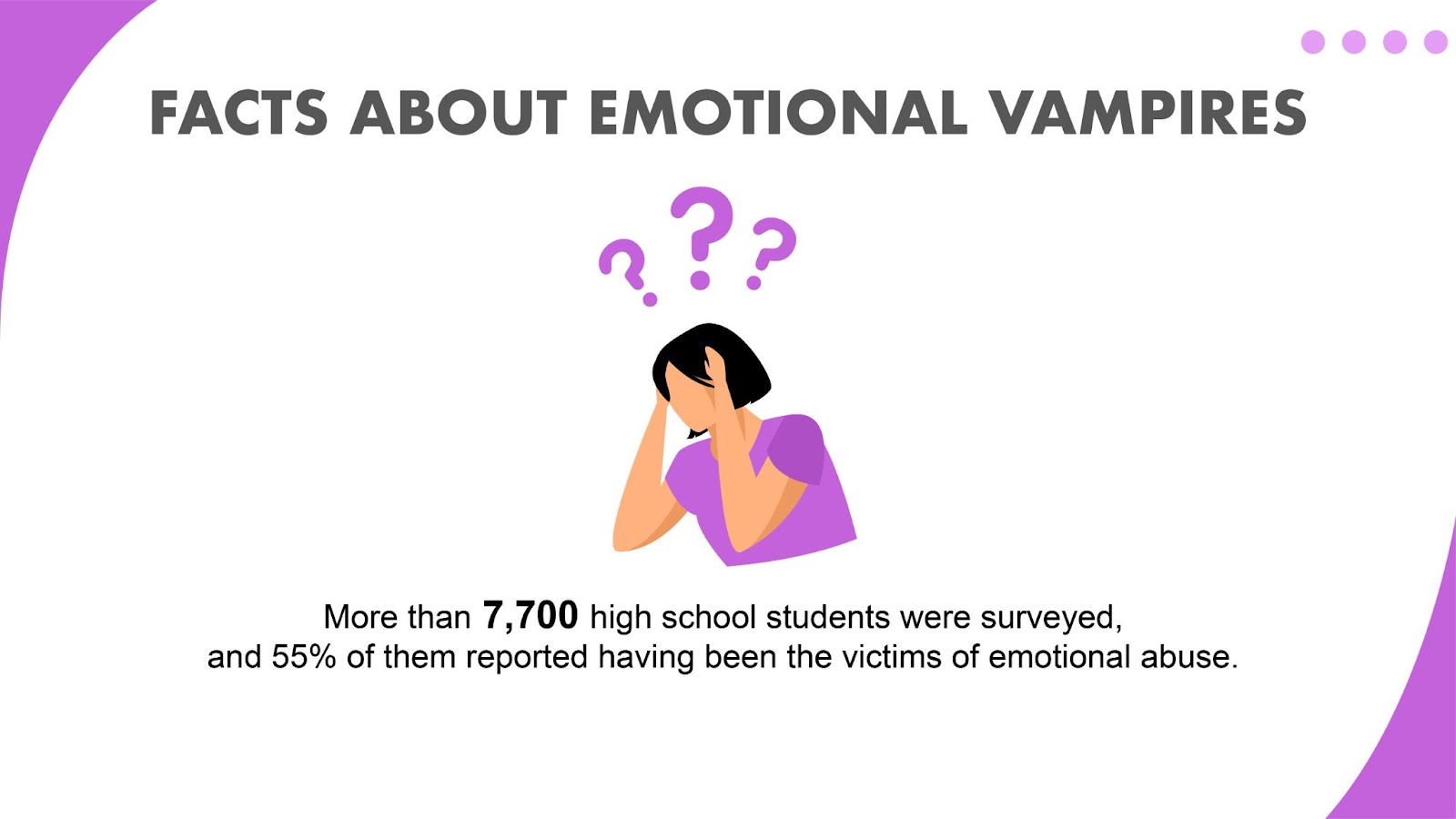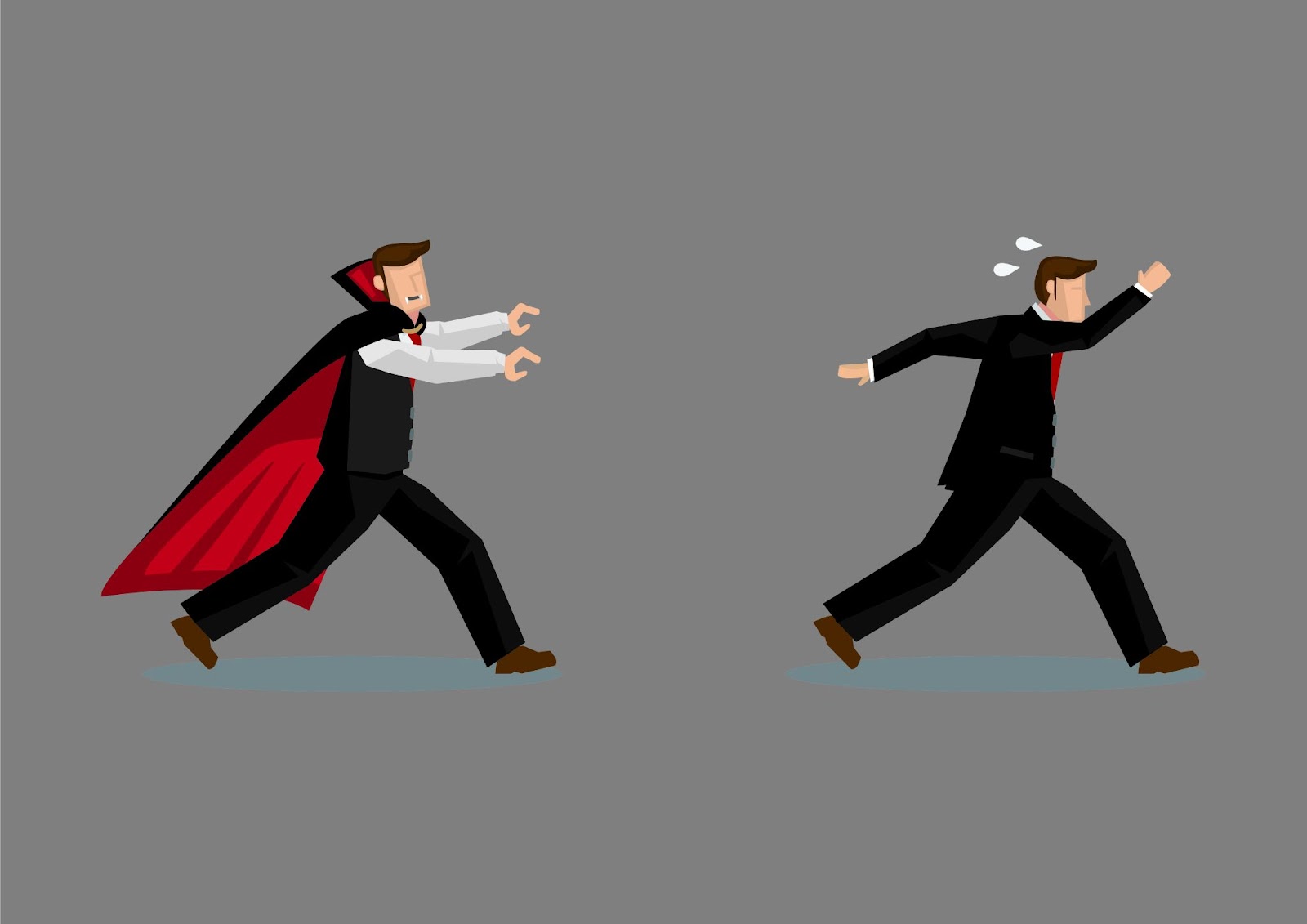7 Effective Ways to Deal with Emotional Vampires
Majority of this world has been a victim of emotional abuse one way or another. More than 7,700 high school students were surveyed, and 55% of them reported having been victims of emotional abuse. Do you have any coworkers who you prefer to avoid or who make you feel uneasy after interacting with them? Maybe you've found that working with a certain coworker drains you. Monsters might not exist, but emotional vampires are, and they can seriously undermine your self-assurance, well-being, and productivity. Find out what emotional vampires do, how to recognise one (at work and elsewhere), and how to handle them.

Emotional Vampires: What Are They?
A vampire is a creature from folklore that survives by consuming the blood of other living things. They normally belong to the undead category and live forever, however they can't endure the sunlight for too long. Most likely, you won't see many of them hanging out near your workplace.
On the other side, energy vampires flourish at work. We give our all to our work and gauge our self-worth based on our successes. An emotional vampire eats the things we value most.
Although emotional vampires don't consume human blood, they act in a manner that drains the energy, vigor, and self-assurance of others around them. They drain us of our enthusiasm and vigor. Although they may not be eternal, their criticism and psychological harm can endure. Fortunately, shedding light on their actions will help you keep them at a distance.
Emotional vampires can affect your mental health, whether they are acting in this way on purpose or not. Here are five categories of emotional vampires and a guide to recognise each one from their actions and words:
7 Indicators That Someone is an Emotional Vampire
It will take a while if you wait for an energy vampire to reveal itself. Here are some negative traits that emotional vampires frequently exhibit:
Gaslighting
You can become doubtful of your own sanity, sense of reality, or gut instincts by being gaslighted. A gaslighter can make you feel uninformed and even get you to question your own recollection, whether consciously or unconsciously.
Aggressive Passivity
Passive-aggressive individuals hardly ever make requests for what they desire. Instead, they attempt to influence you to act in accordance with their wishes. Even if they were never made known, people will frequently hold you responsible for failing to live up to their expectations.
Responsibility
Emotional vampires don't often accept accountability for their deeds. If you bring up a blunder they've made that harms you, they'll frequently find a way to put the blame somewhere else—or at least on someone other than themselves.
Guilt
Emotional vampires' go-to tool is guilt. When they make you feel guilty or like you need to apologize, they often use this as an excuse to avoid taking responsibility.
All-or-Nothing
Many people have a propensity for all-or-nothing thinking. It's a characteristic of mood disorders like depression and anxiety. They are not emotional vampires just because of that. When people apply their all-or-nothing mindset to others, though, it may turn poisonous. They might categorize people as nice or wicked, diligent or slothful, intelligent or foolish. This is reductive at best and harmful at worst.
The "It's all about me" Syndrome
People that are toxic frequently act in an egotistical or self-centered manner. There is no point in attempting to explain to them what happened. Except when it pertains to them, they have zero interest. And they'll figure out a way to bring everything full circle.
Personal Emotions
How you feel after interacting with an emotional vampire, especially for a prolonged period of time, is by far one of the most crucial signs of their presence. An emotional vampire is someone who makes you feel emotionally spent, down, insecure, or as though you should have said nothing at all.
How Do You Handle a Vampire of Emotions?
We all need to develop the ability to interact with people we'd rather avoid, and this is particularly true at work. Although we have little control over when or how emotional vampires appear, we can reduce their negative effects. While we have little control over how or when emotional vampires appear, we do have some influence over how much of an impact they have on us. You may feel more in control if you develop coping mechanisms for toxic people and their behaviors in your life. You'll become more resilient, experience less stress, have more energy, and learn how to deal with their behavior. To cope with an emotional vampire, follow these five steps:
1. Establish Clear Boundaries
Emotional vampires adore the ambiguity of the gray area. Make them accountable for their actions. Define your expectations of them and your boundaries for their behavior with you.
For instance, get the time you're scheduled to meet someone in writing if they have a history of being late. Make it plain that you'll be departing if they aren't there after 15 minutes, and then do it if they are. You can lessen the damaging effects of their actions on you by setting limits. When the results of their actions start to have an effect on them, they will be more likely to change..
2. Focus on the facts
The term "emotional vampire" has a specific meaning. They adore using your emotions to their advantage. When interacting with these people, stick to the facts. Give them instances of particular situations, rather than just expressing how they made you feel. Talk to a manager if it occurs at work, or suggest that they raise their concerns with HR.
3. Exercise mindfulness.
Developing self-awareness of how emotional vampires' actions affect you is one of the best ways to mitigate their negative effects. By engaging in mindfulness practices, you can become more aware of the emotional levers they're pulling to control you. You can avoid getting provoked or drawn into a blame game by practicing mindfulness.
How Can Farskills Courses Help With Dealing With Emotional Vampires?
Humans are hardwired for social interaction. We don't naturally desire to break up ties or minimize the suffering of others. However, we should never put ourselves in a position where we have to help others at the cost of our own well-being.
Your most effective defenses against emotional vampires are developing the ability to spot warning signs in your interpersonal interactions and placing a high value on your own well-being.



